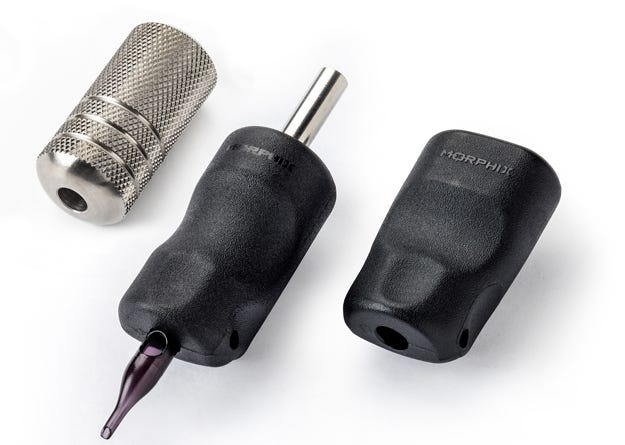Solvay's Radel PPSU takes a load off tattoo artists
"Here, hold this," says Maria Gallahue-Worl, Global Healthcare Business Manager, Solvay Specialty Polymers (Alpharetta, GA), as she hands me a standard steel needle grip used by tattoo artists to ink their creations. "Now, hold this one." The second grip is molded from Radel polyphenylsulfone (PPSU) from Solvay, and it is measurably lighter. That is a big deal in the world of professional tattooing, where wrist and hand pain is rampant as a result of the weight of the device, the constant vibration and the repetitive motions.
June 10, 2015
"Here, hold this," says Maria Gallahue-Worl, Global Healthcare Business Manager, Solvay Specialty Polymers (Alpharetta, GA), as she hands me a standard steel needle grip used by tattoo artists to ink their creations. "Now, hold this one." The second grip is molded from Radel polyphenylsulfone (PPSU) from Solvay, and it is measurably lighter. That is a big deal in the world of professional tattooing, where wrist and hand pain is rampant as a result of the weight of the device, the constant vibration and the repetitive motions. Morphix (Chicago), a designer and manufacturer of tattoo equipment, has engineered some relief for tattoo artists with what it calls the first sterilizable, injection molded tattoo grips. It sampled multiple materials for its signature Humbolt and Flatiron grips, but ultimately it settled on Radel PPSU. The material's resistance to sterilization clinched the deal, says Gallahue-Worl.
 Since introducing its grips in 2008, Morphix has sampled polysulfone polyethylenimine, polyethersulfone, polyoxymethylene, polybutylene terephthalate and polyphenylene sulfide in different ratios and with different fillers. The best performance that earlier models of the Humbolt and Flatiron grips could achieve was 250 sterilization cycles before failure modes started to kick in. Then the company tested Solvay's Radel PPSU material, which reached a milestone of 1,000 sterilization cycles under load, said Morphix President and CEO, Todd Myers.
Since introducing its grips in 2008, Morphix has sampled polysulfone polyethylenimine, polyethersulfone, polyoxymethylene, polybutylene terephthalate and polyphenylene sulfide in different ratios and with different fillers. The best performance that earlier models of the Humbolt and Flatiron grips could achieve was 250 sterilization cycles before failure modes started to kick in. Then the company tested Solvay's Radel PPSU material, which reached a milestone of 1,000 sterilization cycles under load, said Morphix President and CEO, Todd Myers.
"We've never seen a thermoplastic material perform as well in stress testing as Radel PPSU," said Myers in a news release distributed by Solvay. "Each grip design integrates two sets of metal threads to which we simultaneously applied 75 ft-lb (101.7 N-m) of torque, without observing any cracking or breakage. The tensile strength for Radel PPSU is off the charts for our product. No other material came close."
The material also allowed Morphix to apply a more ergonomic design to the grip, with appropriately placed indents, and it improved the longevity of the device. The new grips last four times longer than previous designs, said Myers, and they maintain their aesthetics longer in the tattoo parlor's unforgiving environment of dried ink, blood, harsh surface disinfectants and the daily rigors of steam-heat sterilization.
The needle grips made of Radel are 60% lighter than the metal versions and reportedly significantly reduced manufacturing costs. Solvay featured this and other recent applications at the co-located MD&M East and PLASTEC East events, which run through June 11 in New York.
Although tattoo tools are not technically medical devices in the United States—they are classified as such in Brazil, however, Gallahue-Worl informed me—this project fell under the purview of Solvay's Healthcare Business partly because of requirements involving cleanliness and sterilization.
Solvay has been a reliable supplier to the healthcare sector for more than 25 years and has established a portfolio of medical-grade polymers for devices, instruments and equipment. It also offers Solviva-branded biomaterials for implantable applications.
About the Author(s)
You May Also Like




